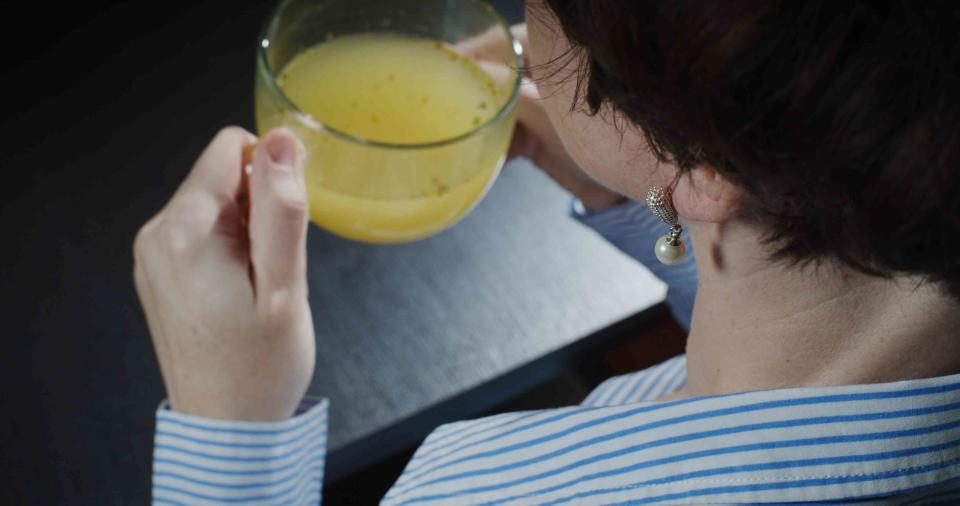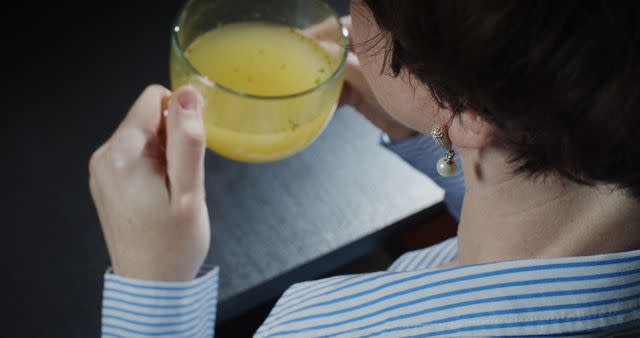Home Remedies for Diverticulitis
Strategies for Fast Relief and Longer-Term Management

invizbk / Getty Images
There are a few home remedies that make the list of ways to relieve diverticulitis pain fast. But by and large, home remedies for diverticulitis are part of a longer-term game plan for preventing flare-ups. Examples include avoiding red meat, exercising, and using fiber supplements.
This article discusses what you can do to help soothe diverticulitis pain quickly at home and remedies that may, with time, improve symptoms and prevent future attacks.

invizbk / Getty Images
Fast Relief for Diverticulitis Pain
You can't stop diverticulitis pain immediately. Even strategies that help diverticulitis pain "fast" may never seem to act fast enough when you are having an attack.
Nevertheless, these at-home strategies can help calm symptoms of a diverticulitis flare-up and lessen the time you spend in extreme pain:
Rest: You may need to take it easy for a few days to give your colon a break and inflammation a chance to subside.
Heating pad: Place one on your abdomen to soothe mild cramps and pain.
Tylenol (acetaminophen) for pain: Non-steroidal anti-inflammatory drugs (NSAIDs), such as Advil (ibuprofen) ,Aleve (naproxen), and aspirin, are not recommended in people with diverticulitis. These medications may increase the risk of diverticulitis and diverticular bleeding.
Longer-Term Home Remedies for Diverticulitis
Certain changes to your diet and lifestyle won't provide instant relief, but they can calm down a diverticulitis attack with time and prevent more attacks in the future.
Home remedies for diverticulitis that may be recommended include following a liquid diet, increasing your intake of fiber and anti-inflammatory foods, avoiding red meat and high-fat foods, cutting back on alcohol, exercising, and trying certain supplements.
Follow a Clear Liquid Diet
Switching to a clear liquid diet for a few days can help you start to feel better.
A clear liquid diet includes drinks and foods such as:
Clear fruit juices without pulp (such as cranberry or apple juice)
Soft drinks
Sports drinks
Clear broths (such as chicken, beef, or vegetable)
Ice pops without pieces of fruit or pulp
Gelatin without fruit pieces
Water, coffee, or tea without milk
Once your symptoms have improved, your healthcare provider can advise you on how to reintroduce solid foods into your diet.
Increase the Amount of Fiber You're Eating
In years past, a low-fiber diet was recommended for diverticular disease. It’s now known that not getting enough fiber through foods may be part of why diverticula develop in the first place.
It’s not known exactly how much fiber may help avoid symptoms. However, the American Society of Colon and Rectal Surgeons (ASCRS) recommends that, in general, adults eat between 20 and 30 grams of fiber per day, so this can be a helpful guideline.
Related:Soluble vs. Insoluble Fiber: What's the Difference?
Add Anti-Inflammatory Foods
Foods that decrease inflammation associated with diverticulitis include:
Apples
Avocados
Beans (such as red beans, pinto beans, and black beans)
Berries (such as blueberries, raspberries, and blackberries)
Broccoli
Cherries
Dark green leafy vegetables (such as kale, spinach, and collard greens)
Nuts (such as walnuts, almonds, pecans, and hazelnuts)
Oily fish (such as salmon, herring, mackerel, sardines, and anchovies)
Sweet potatoes
Whole grains
Walnuts
Related:Foods to Eat With Diverticulitis
Avoid Red Meat and High-Fat Foods
Avoiding these foods may be recommended during a flare-up of diverticulitis, as they can put added stress on the colon. In one study, people who ate less red meat had fewer bouts of diverticulitis.
Eating red meat and processed meat may also increase your risk of diverticular disease in the first place.
A 2017 study tracked 46,418 men and their diet over a period of 28 years. There were 18 foods and food groups included in the study: processed meat, red meat, organ meat, fish, other vegetables, refined grains, high-energy beverages, low-energy beverages, tomatoes, beer, wine, tea, coffee, dark yellow vegetables, green leafy vegetables, snacks, fruit juice, and pizza.
The authors found that an anti-inflammatory diet that included higher amounts of green leafy vegetables, dark yellow vegetables, coffee, tea, and lower amounts of red meat, processed meat, refined grain, and sugary beverages may help reduce the risk of diverticulitis.
Reduce Alcohol Intake
Drinking too much alcohol may increase the risk of diverticulitis by two to three times. Avoiding alcohol is usually recommended during a flare-up while following a liquid diet.
Exercise
It’s usually recommended that people get enough physical activity for their age and their fitness level. For preventing diverticulitis, there have been mixed results in studies that looked into a link between exercise and diverticular disease.
There are no specific recommendations, but it’s generally thought that exercise may be helpful in preventing some cases of diverticular disease.
Try Probiotics
There’s still not a lot of evidence for or against the use of probiotics (beneficial gut bacteria) as a treatment for diverticular disease.
One study showed that people with diverticulitis who took probiotics had less associated bloating, pain, and fevers. However, they didn’t have fewer diverticulitis flare-ups overall.
For that reason, it’s important to talk to get some guidance from a healthcare professional before trying probiotics.
Related:How to Choose a Probiotic
Herbs and Supplements
Fiber supplements may be recommended for diverticular disease while the condition is not causing any symptoms.
Other herbs and supplements have been suggested for diverticular disease, include garlic, green tea, turmeric, ginger, marshmallow root, flaxseed, or licorice. It’s thought that some supplements may have anti-inflammatory effects.
Unfortunately, no trials have been conducted on these supplements to be able to say whether they have any benefit.
Vitamin D has also been studied in terms of how it might be related to diverticular disease. There are not a lot of data available, but one study did show that people who had higher-than-average levels of vitamin D were less likely to need hospitalization for a diverticulitis flare-up.
Summary
Using a heating pad, taking Tylenol (acetaminophen), and resting are all strategies you can employ at home to soothe diverticulitis pain fast—or at least faster.
Home remedies used for diverticulitis are more often used to improve symptoms over some time and prevent future attacks. Examples include getting more fiber, avoiding red meat, exercising, and trying supplements like garlic, ginger, and vitamin D.

